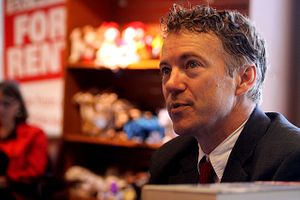What about Rand Paul? Elected in the Republican midterm wave of 2010, the libertarian Paul seemed to sit uneasily with the Kentucky electorate, which historically had remained happy with a succession of conservative Democrats and statist Republicans. Known now mostly for his critiques of the national surveillance state, Paul has become perhaps the most prominent, and eloquent, representative within the GOP for the strategic position known as “offshore balancing.” The position, worked out in traditional “realist” academic circles during the 1990s and 2000s, argues that the United States should abandon its post-war focus on formal alliances, step back from entanglement in Eurasian politics, and adopt a less interventionist pose worldwide.
Paul’s association with offshore balancing stems, in large part, from his father’s embrace of the concept. Ron Paul ran for President in 2008 on a non-interventionist platform, distinguishing himself from the rest of the GOP field. The elder Paul has made a career of arguing the quasi-isolationist (to borrow the term of his critics) position on foreign affairs.
But what does offshore balancing mean for the Asia-Pacific? We can imagine that a Paul presidency would resist the temptation and risk of commitment to Japan or any of the South China Sea claimants with respect to potential conflict with China. If offshore balancing can’t avoid war over a few rocks in the East China Sea, or a few piles of sand in the South China Sea, then it’s not worth very much as a strategic perspective.
But nearly everyone in American foreign policy circles, including most offshore balancers, argues that maintaining freedom of navigation represents a core U.S. national interest. The United States has demonstrated a willingness to fight on behalf of freedom of navigation since at least the War of 1812. And the key challenges the United States faces in the South China Sea involve concerns over freedom of navigation. The most critical flashpoints for a conflict between China, its neighbors, and the United States lay in the claims to control islands in the South China Sea, with accompanying rights to the territorial seas surrounding them.
Despite a long paper trail and a number of speeches, Paul hasn’t offered much clarity on his views of the security of the South China Sea. Paul’s website includes a declaration that the United States should “stand by its allies abroad,” but gives precious little on what that might mean. There’s little question that Paul has repositioned himself to become more congenial to the hawkish wing of the Republican Party. Notably, he signed Tom Cotton’s letter to the Iranian government, positioning himself in alliance with the neoconservative right. And it’s also worth noting that Paul’s vision of American foreign policy leaves a lot of room for intervention. Paul supported the war in Afghanistan, and supports continuing the campaign of airstrikes against ISIS. Paul has also argued for an increase in the defense budget, funded by offset cuts in domestic spending.
On the other hand, Paul has forcefully argued that free trade could help resolve the security problems in Asia. Paul is a strong advocate of the Trans-Pacific Partnership, arguing that the pact is central to the U.S. “pivot” to East Asia. Paul vision of the “securitization” of the TPP differs from that of Ash Carter, in that he seems to value the pact insofar as trade brings peace, rather than as a bulwark against Chinese expansionism. However, Paul opposed fast track authority on the grounds that it gave the executive too much authority to negotiate in secret.
The best conclusion to make, perhaps, is that Rand Paul is the junior Senator from Kentucky, and that the views of the junior Senator from Kentucky don’t carry that much weight in the APAC anyway. But Paul is also a Presidential candidate, and the standard bearer for a particular foreign policy vision within the Republican Party. It’s worth our time to work out the implications of his views in greater detail.
This article is part of a series, written by Kentucky-based Robert Farley, on the links between the U.S. state of Kentucky and the Asia-Pacific. See his previous posts on Kentucky’s Mitch McConnell, horse, bourbon, and car links with the region.

































